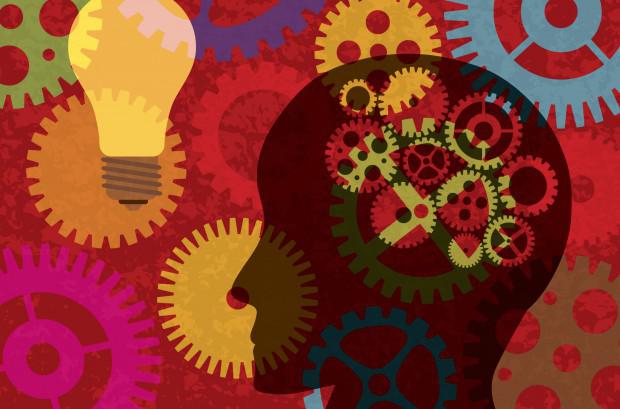How old is your brain?
 Bashny.Net
Bashny.Net
The technique allows to determine the real age of the human mozga
Each new wrinkle shows that our skin is aging and our creaking joints and stouter waist allude to the aging body.
But what about the brain? After all, what happens in the head as they age, it is not so obvious.
Many people know that the aging man slowly begins to process the information. However, doctors still do not know how to accurately estimate the speed of the aging brain.

Doctors in England are developing a new method of calculating the "Brain Age." It will take into account many factors, such as weight, cholesterol levels, consumption and much more. Accounting for all these factors will help determine how many people have lost brain cells and how quickly it happened, because it is known that the aging of the human brain begins to literally shrink as cells age, lost more and more. Hundreds of cell-cell contacts (synapses) that help process the information age also begin to fall apart. However, the brain of some people almost does not show age-related changes for a variety of reasons, such as genetics and lifestyle.
Answer the test questions, proposed below. This test was developed by Dr Vincent Fortanass, professor of clinical neurology at the University of Southern California, and it will help to know the real age of your brain, and evaluate how it affects your everyday habits.
For each of the following questions, answer either "yes" or "no": Every night I sleep seven to eight hours (or more). Every day I eat at least five servings of fruits and vegetables high in antioxidants. Every day I eat at least one serving of blueberries, raspberries or blackberries. At least three times a week I eat baked or grilled fish high in omega-3 fatty acids. At least five times a week I take fish oil high in omega-3 fatty acids, or supplements on the basis of flax seeds. I take a daily supplement containing folic acid and multivitamins. I take a daily aspirin in small doses. At least five times a week I drink red wine or grape juice. I train most days of the week, with each workout takes at least 30 minutes. At least five times a week I read a complex book, solve crossword puzzles or Sudoku, or doing other activities that require active learning, memorization, computation, analysis and problem solving. In my family there were people with "longevity genes" that have lived 80 years or more without impairing memory. My total cholesterol level of less than 5, 2 mmol / l. My "bad" cholesterol (LDL) below 3, 3 mmol / L. I do not suffer from excess weight. My diet - "Mediterranean", it is dominated by fruits, vegetables, whole grains, legumes, nuts, seeds. The source of fat is olive oil and a small amount of red meat. Instead of eating butter and margarine, I use olive oil, and do not use any trans fats. I have never smoked cigarettes. My blood pressure is normal. I do not have diabetes. I do not have the metabolic syndrome (which is characterized by high levels of triglycerides, a common obesity and hypertension), which is also known as "insulin resistance syndrome". I do not have sleep disorders such as snoring, obstructive sleep apnea or chronic insomnia. Daily uncontrollable stress is not a problem for me. I have a strong "support group" and I like to spend time with friends, colleagues or family members. I'm not going to hurt Alzheimer's disease, and to prevent it is willing to do whatever it takes. Now count how many questions you answered "yes", and see your scores:

Each new wrinkle shows that our skin is aging and our creaking joints and stouter waist allude to the aging body.
But what about the brain? After all, what happens in the head as they age, it is not so obvious.
Many people know that the aging man slowly begins to process the information. However, doctors still do not know how to accurately estimate the speed of the aging brain.

Doctors in England are developing a new method of calculating the "Brain Age." It will take into account many factors, such as weight, cholesterol levels, consumption and much more. Accounting for all these factors will help determine how many people have lost brain cells and how quickly it happened, because it is known that the aging of the human brain begins to literally shrink as cells age, lost more and more. Hundreds of cell-cell contacts (synapses) that help process the information age also begin to fall apart. However, the brain of some people almost does not show age-related changes for a variety of reasons, such as genetics and lifestyle.
Answer the test questions, proposed below. This test was developed by Dr Vincent Fortanass, professor of clinical neurology at the University of Southern California, and it will help to know the real age of your brain, and evaluate how it affects your everyday habits.
For each of the following questions, answer either "yes" or "no": Every night I sleep seven to eight hours (or more). Every day I eat at least five servings of fruits and vegetables high in antioxidants. Every day I eat at least one serving of blueberries, raspberries or blackberries. At least three times a week I eat baked or grilled fish high in omega-3 fatty acids. At least five times a week I take fish oil high in omega-3 fatty acids, or supplements on the basis of flax seeds. I take a daily supplement containing folic acid and multivitamins. I take a daily aspirin in small doses. At least five times a week I drink red wine or grape juice. I train most days of the week, with each workout takes at least 30 minutes. At least five times a week I read a complex book, solve crossword puzzles or Sudoku, or doing other activities that require active learning, memorization, computation, analysis and problem solving. In my family there were people with "longevity genes" that have lived 80 years or more without impairing memory. My total cholesterol level of less than 5, 2 mmol / l. My "bad" cholesterol (LDL) below 3, 3 mmol / L. I do not suffer from excess weight. My diet - "Mediterranean", it is dominated by fruits, vegetables, whole grains, legumes, nuts, seeds. The source of fat is olive oil and a small amount of red meat. Instead of eating butter and margarine, I use olive oil, and do not use any trans fats. I have never smoked cigarettes. My blood pressure is normal. I do not have diabetes. I do not have the metabolic syndrome (which is characterized by high levels of triglycerides, a common obesity and hypertension), which is also known as "insulin resistance syndrome". I do not have sleep disorders such as snoring, obstructive sleep apnea or chronic insomnia. Daily uncontrollable stress is not a problem for me. I have a strong "support group" and I like to spend time with friends, colleagues or family members. I'm not going to hurt Alzheimer's disease, and to prevent it is willing to do whatever it takes. Now count how many questions you answered "yes", and see your scores:
- 0-11: You have a high risk of developing Alzheimer's disease. Add 10 years to your chronological age, and get the real age of your brain. Right now, call your doctor and discuss with him health problems that you have, of course, there.
- 12-14: You have a moderate risk of developing Alzheimer's disease. To get the real age of the brain add to his chronological age of five years.
- 15-19: OK. The real age of your brain the same as your chronological age. However, a small risk of developing Alzheimer's disease is still there, so be careful. Carefully read the test to see what changes need to be made to your diet to your training regimen and mode of relaxation.
- 20-22: Not bad! From his chronological age, subtract five years, and get the real age of your brain. Are you seriously care about their physical and mental health. Check the questions to which you answered "no", and do not forget to pay attention to the changes that must be made.
- 23-24: Congratulations, you are good to grow old! To get the real age of the brain out of its chronic subtract 15 years of age. Currently, you are healthy and you have a youthful, very productive mind. If things will go well, and further, the risk of developing Alzheimer's disease is very low.
1. Train your body
People Train your brain by solving puzzles, Sudoku, or just get some new skills, such as learning foreign languages. All this helps to reduce the rate of aging of the brain, although to a small extent.
But the maintenance of normal physical shape of the body seems to be working better. Studies show that exercise helps to keep the brain in top shape. Even a simple walk for 30 minutes a day can seriously slow down the aging process of the brain.
2. Sleep longer
Lack of sleep leads to aging. Studies show that brain age people working the night shift for the past ten years, an average of more than six years of their chronological age. Lack of sleep may accelerate the death of brain cells. Poor nutrition also causes brain aging. Studies have shown that people who ate junk food all week, seriously deteriorating memory.
3. Give up bad habits
What is bad for your body, it is usually bad for the brain. Smoking, being overweight, high blood pressure, high cholesterol - all this increases the rate of brain aging, as all this affects the condition of blood vessels in the body, and the condition of the blood vessels in the brain. The brain must be very good blood supply, and even one tiny bleeding can cause the death of its cells.
4. Live a rich social life
The most simple way to keep the mind young - is to meet other people. People who long remain "socially active", the rate of aging of the brain is reduced. The researchers believe that the interaction with other people efficiently stimulate areas of the brain involved in planning and decision-making, and thereby reduces its rate of aging.
via factroom.ru
Tags
See also
Your brain is a lazy bastard or how to prevent freezing and degradation of the mind
How porn rebuilds your brain and destroys personal lives
"Your brain - the lazy bastard" or how to prevent freezing and degradation of the mind
Neyrobika - longevity of your brain
Neuroscience and mindfulness: how to bring happiness to your brain
How to unleash the power of the brain — 77 tips
What happens to Your brain when You stop eating sugar?
How to save on health?
















